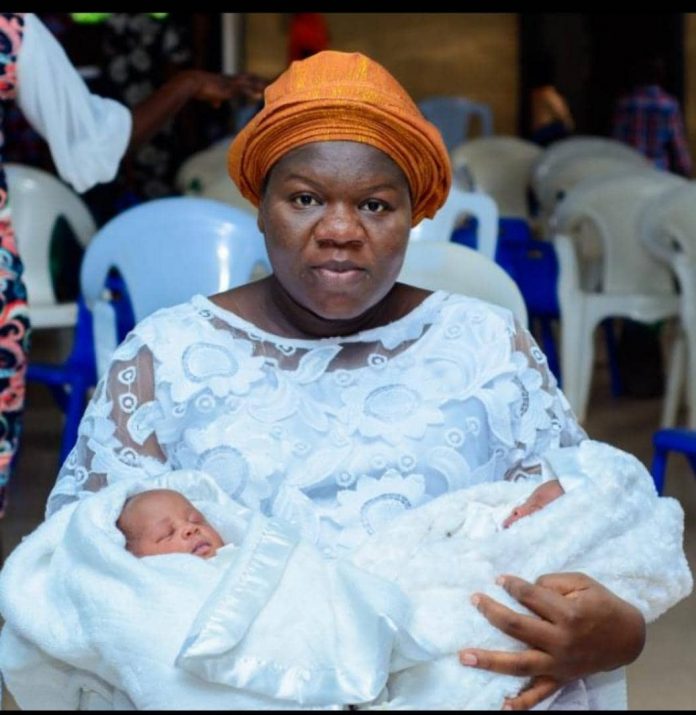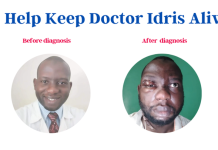

By Shola Ilesanmi, Akure.
Solape Oluwasogo, a middle aged nurse, was expecting multiple deliveries but was skeptical of enrolling for the Abiyamo Maternal and Child Health Insurance Scheme, an initiative of the Ondo state government to promote access to maternal and child care.
Though the scheme was operational at the Mother and Child Hospital Akure, where she works, Oluwasogo was doubtful about the efficiency of the scheme.
Having previously undergone two caesarean sections, she knew she would have to go under the knife again to deliver her babies. However, the medical bills she hoped to pay were already giving her nightmares, no thanks to the government for defaulting in salary payment. Her husband could not help either as his business was facing multiple challenges.
Oluwasogo was therefore left with no option than to enrol for the Abiyamo health scheme. Otherwise, the couple would have to cough out some hundreds of thousand naira for a caesarean section.
“I never believed I would not pay a dime for my registration card, antenatal care, ultrasound, delivery pack, and even the caesarean section,” Oluwasogo said. “This would have cost me close to 300,000 naira having had two previous operations. It was really life saving and relieving for my family.”
Oluwasogo is one of many women in Ondo state who have relied on the Abiyamo Maternal and Child Health Insurance Scheme for affordable delivery.
To Nifemi Ayeni, who got to know of the Abiyamo Insurance scheme during a visit to the Mother and Child Hospital Akure after she became pregnant, said she enrolled with doubts that the programme might not be as efficient as the government made it seem.
With a bouncing set of twins after a caesarean section at no cost to her under the scheme, Ayeni joined the league of beneficiaries propagating the good news of the Abiyamo initiative.
Maternal health in Ondo State
The Abiyamo Maternal and Child Health Insurance Scheme (AMCHIS) is a component of the Ondo State Contributory Health Insurance Scheme (ODCHS) that was launched by Governor Oluwarotimi Akeredolu in December 2019.
The flag off came on the heels of the collapse of the erstwhile Abiye Safe Motherhood and Agbebiye programmes introduced by Akeredolu’s predecessor, Olusegun Mimiko, as a result of funding challenges even before the exit of the Mimiko administration in 2017.
Ondo state’s journey to maternal and child health redemption started in 2008 when the National Demographic and Health Survey revealed that Ondo ranked top in Nigeria’s southwest region on infant and maternal deaths. In fact, about 745 deaths per 100,000 live births were recorded in the following year, according to the state government.
The statistics prompted the Mimiko government to introduce the Abiye (Safe Motherhood) programme to address the challenge. Increasing access to maternal healthcare services where delivery is efficient and effective was top of the government’s agenda at the time.
The intervention through different bouquet of services enjoyed the support and applause of development partners and international organisations like the World Bank, Bill and Melinda Gates Foundation, UNICEF World Health Organisation, WHO, and the National Primary Healthcare Development Agency, NPHCDA.
But a 2012 report put together by the government known as Confidential Enquiry into Maternal Deaths in Ondo State (CEMDOS) showed that public health facilities had the highest number of maternal deaths. Health authorities said they could have been mismanaged by the traditional birth attendants (TBAs) and mission home operators, otherwise called “Agbebi” in local parlance, before they were transferred to the health facility.
The revelation pushed the government to action.
Two years later, Mimiko’s administration responded by scaling the Abiye programme into the Agbebiye initiative, where the local birth attendants must not take delivery but refer pregnant women to government health facilities.
The initiative, which rewarded the attendants with two thousand naira per referral, was introduced to ensure only skilled birth attendants were engaged in order to guarantee the survival of mothers and children and also got global commendation from development partners including the Center for Strategic and International Studies, CSIS.
At the twilight of Mimiko’s administration in 2016, the then health commissioner, Dr Dayo Adeyanju said maternal mortality ratio in Ondo had dropped to 112/100,000 live births and many had looked forward to a consolidation.
Are the TBAs/MHBAs back to business?
Findings revealed the Traditional Birth Attendants (TBAs) and Mission Homes Birth Attendants (MHBAs) have also resumed business of taking delivery against the directive of the previous government on referrals, a move that might have led to a resurgence of deaths in the hands of unskilled attendants.
One of their latest casualties was 43-year-old Kolawole Adetola, who was rushed to the University of Medical Sciences Teaching Hospital (UNIMED) complex in Ondo state capital Akure in March 2021. The deceased suffered complications, including excessive bleeding following delivery at a mission home, called the Christ Apostolic Church, Oke Idalare in Oba Ile Akure.
Efforts by medics to save her proved abortive as she died minutes after she arrived at thea government health facility, leaving behind an infant, husband, two other children and relatives.
Unlike the previous government under Governor Mimiko that mandated reporting of maternal death with a combination of the CEMDOS law and task force, the present administration had no clear cut direction in this regard and the owners and operators of the mission home went scot-free after the deceased family quietly retrieved their corpse for burial.
Perhaps worried by this unsavory situation in the health sector and determined to approach access to healthcare by pregnant women and children under the age of five from a more sustainable perspective, Governor Akeredolu initiated the Abiyamo Maternal and Child Health Insurance Scheme (AMCHIS) in 2019.
One year later, the state recorded 7,911 antenatal registrations and 3,183 deliveries that included over 900 cesarean sections free of charge.
The Universal health coverage (UHC) recommends that everyone obtains the health services they need without financial hardship and this requires increasing the care citizens receive, while decreasing the extent to which they pay for that care out of pocket using either insurance premiums or general government revenue like Health tax to a trust fund.
Abiyamo was initiated in line with the UHC vision and to broaden its scope, the government expanded service providers from the two Mother and Child Hospitals in Akure and Ondo — both in the central senatorial district — that existed during Abiye to five other secondary facilities, including the State Specialist Hospital in Ikare Akoko and the General Hospital in Owo in the northern senatorial district.
Others include the General Hospital in Ore, the State Specialist Hospital in Okitipupa and the General Hospital in Igbokoda, all in the southern senatorial district. In addition, UNIMEDTHC in Ondo and Akure, as well as the Mother and Child Hospitals in the two cities.
The government made a budgetary provision to enable the take off of the health insurance model, though this was not made public until the 2020 that 600 million naira was earmarked for the purpose in the budget. This will then be an annual thing to guarantee availability of funds.
It also signed up for the Basic Healthcare Provision Fund (BHCPF) of the federal government as a way to complement the services of the insurance fund.
Governor Akeredolu at the flag off for the Basic Healthcare Provision Programme in Ondo state said “Our administration has paid a commitment fee of one hundred million naira and also fulfilled other criteria for benefitting from the Basic Healthcare Provision Fund (BHCPF),”
“Therefore, the secondary facilities in all 18 LGAs, shall serve as referral centres for the 203 Primary Healthcare (PHC) facilities designated to implement the BHCPF.”
“The good people of Ondo State in all our communities shall thus easily access maternal and under-5 healthcare services in the 203 PHC facilities and all secondary facilities in no distant time.”
How does the Abiyamo Scheme work?
Residents of Ondo state will have access to the Abiyamo scheme using the residency card (Kaadi Igbeayo) introduced by the previous government, while pregnant women without the card can freely register with the State Information Technology Agency (SITA) officials at the seven designated Mother and Child Hospitals.
The government also encouraged fathers and non-pregnant women to get their residency cards to enable their under-5 children to benefit from the health insurance scheme.
Dr Abiodun Oyeneyin, the General Manager of the Ondo State Contributory Health Commission in charge of the scheme explained that AMCHIS is being funded in two ways — the bundled tariff and fee-for-service covering antenatal care, delivery, including caesarean section, neonatal care, up to six weeks postnatal care for mother after delivery.
Others include treatment of common illnesses in children under five years, management of cervical incompetence in pregnancy with cervical cerclage and anti-D injection for rhesus negative mothers.
For the bundle tarrif, the benefitting facility is paid a lump sum upfront the cost of the services before the enrollee visits the hospital for the services that include antenatal care and ultrasound based on the figures extrapolated during registration for Kaadi Igbeayo.
The fee-for-service covers delivery, caesarean session and Anti-D injection for rhesus negative mothers.
“During antenatal, once they do their blood test and its confirmed that they need the injection, we get their data and send them to an accredited pharmacy that we have outsourced that service to while we also pay after the delivery, whether during virginal or caesarean session” Dr Oyeneyin explained
To encourage hospital utilisation, Oyeneyin said the commission embarks on regular sensitisation on and off the media, interface with stakeholders in the state while the standard and quality department constantly interfaces with the enrollees to rate the services of the accredited hospitals for feedback and appropriate action.
Is the Abiyamo scheme a one-in-all solution?
Despite the reach of the Abiyamo scheme, stakeholders say there are some challenges that should be addressed to guarantee its sustenance.
The state chairman of the National Association of Nigerian Nurses and Midwives, Kehinde Olomiye noted that Abiyamo will make health facilities to be better off with more patronage by patients.
However, he advised that to make a success of the scheme “in terms of manpower, there should be increased intake of more midwives into the system. This will help the state government realise its vision to evolve better universal health coverage for its citizenry.”
Also, a social worker, Martin-Mary Falana, said the government is really trying in efforts to meet the unmet health system gaps.
“The people should not leave the health system to the government alone. More involvement of the civil society community will help deepen engagement and contribute to an increase in the uptake of the services in the health facilities as against the popular patronage of the traditional healers.
“Community people can volunteer to support the low workforce recorded mostly in all community health centres. Some health facilities are dilapidated and some do not have both skilled and unskilled staff to attend to patients.”
“Abiye and Agbebiye were undoubtedly novel and homegrown health solutions that helped to reduce maternal mortality in Ondo state,” said Olusola Akinbinu, Executive Director of the Center for Innovative and Inclusive Development for Africa (CIIDA).
“However, the lack of a clear-cut sustainable funding vehicle obviously led to its sudden death.”
Akinbinu explained that the Abiyamo Scheme would, however, outlive the current administration as it had already taken the funding challenges into consideration.
“With the model of funding for the Abiyamo scheme through the State Contributory Health Commission, there is a respite on its sustainability while also addressing the limitations of the erstwhile interventions,” Akinbinu said.
“However, beyond budgetary provision, there must be strong political will to ensure prompt release of funds to the Contributory Health Commission.”
As of July 2021, the Abiyamo scheme has provided succour to more than 11,844 women with 4,544 deliveries, including 3,260 normal delivery and 1,284 caesarean sections.
In addition, data from Mother and Child Hospital in Akure showed that hospital utilisation for delivery improved within the first year of introducing the Abiyamo scheme.
For instance, antenatal registration was 1,791 in 2019. However, the figure nearly tripled in the following to 5,217. Also, enrolment at the children’s OutPatient Department (OPD) rose by 421 but the number of deliveries dropped by 707 over the same period.
A development communication journalist, Segun Olakoyenikan, explained that the figures could point to the fact that the Abiyamo scheme is gradually encouraging hospital use among pregnant women in Ondo.
Olakoyenikan added that the lower figures for hospital delivery compared to the antenatal figures could be a result of the industrial action embarked upon by medical doctors in government facilities in 2020.
“The doctors went on strike last year, this could have forced expectant mothers to deliver elsewhere,” he said. “The delivery number could also mean that the TBAs/MHBAs are still thriving such that pregnant women only go to government hospitals for antenatal care and return to unskilled birth attendants for delivery.”
An Obstetrician and Gynaecologist, Dr Adesina Akintan who said the gains of Abiyamo Scheme as evident in the data of antenatal visits could be lost if the women do not return to deliver.
He pointed accusing fingers at the TBAs and MBHAs for being responsible for the low delivery with skilled birth attendants and high number of critical cases as well as attendant casualties in government facilities.
Akintan who is also the Chairman of the state steering committee on Maternal and Perinatal Death Surveillance and Response emphasised the need for the government to use the carrot and stick approach in collaborating the TBAs and MHBAs
“It is important for women to attend antenatal for management and risk assessment but it is more important for them to return to deliver in the facility or under the care of a skilled birth attendant to minimize any crisis.”
However, the nursing mothers, Oluwasogo and Ayeni want the government to improve on the gains of the scheme and add the cost of post surgery drugs to the packages of the beneficiaries to encourage more women to enroll for the programme.
This story was produced with the support of a reporting grant from Maternal Figures.














